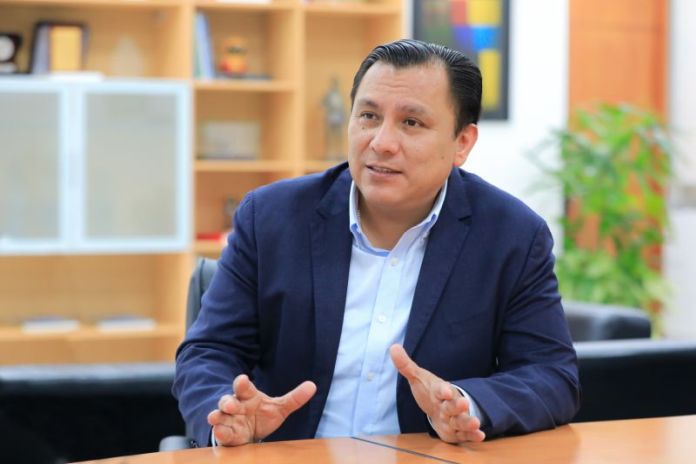- To effectively monitor fisheries resources, fisheries and ecosystems, it is crucial to employ a multifaceted and thorough approach.
By Jesús Eloy Barrientos Ruiz
Matters relating to fisheries, aquaculture and oceans, in general, are of particular importance to Peru given our contribution to the annual global volume of marine capture fisheries production, in which we rank third worldwide according to the Food and Agriculture Organization of the United Nations. We have a coastline that encompasses a great biodiversity with more than a thousand different hydrobiological species. We are aware that this reality is shared by many economies in the APEC region.
Within the framework of the Ocean and Fisheries Working Group, I wish to focus on the progress in the implementation of the three APEC roadmaps: combating illegal, unreported, and unregulated fishing; on marine debris management; and on small-scale fisheries and aquaculture, which set the tone for the activities developed within the OFWG.
The projects, workshops, and documents, among others, developed are usually framed within the referred roadmaps, as they well represent the main areas of interest for our economies within the broad scope of fisheries and oceans topics. However, we also wish to emphasize that there are more issues that deserve attention from our economies within the framework of this working group, such as climate change.
Returning to the work that our economies perform related to the fight against illegal, unreported, and unregulated fishing, it is worth highlighting that, according to data from the Food and Agriculture Organization of the United Nations, billions of dollars are lost annually worldwide due to this nefarious practice, making it necessary to confront it cooperatively in the various international forums in which we participate. The OFWG can greatly contribute to the individual actions that our economies can implement.
In this sense, we must channel our best joint efforts to, among other things, update internal procedures in our economies in response to improvements in compliance with international conservation and management measures by fishing vessels operating on the high seas. Likewise, it is important that our economies are interconnected with existing tools to address illegal, unreported, and unregulated fishing, such as treaties in this area, including the Agreement on Port State Measures to Prevent, Deter and Eliminate Illegal, Unreported, and Unregulated Fishing. However, much deeper and coordinated participation among our economies, specifically, will be required to address the problem with the particularities that our Asia-Pacific region requires.
Marine debris is a phenomenon that affects the entirety of the marine environment; however, its most considerable impact is seen in relation to marine hydrobiological resources. Annually, more than 100,000 marine animals lose their lives worldwide due to more than 13 million tons of plastic being thrown into the sea each year. This not only affects fishing resources but also species such as turtles and seabirds, as well as reefs. To address this problem in our region, it is essential to establish mechanisms of cooperation among APEC economies that ensure the adoption of both joint and individual but coordinated measures within the framework of our objectives within APEC.
It is extremely important to strengthen the participation of smaller commercial fishing and aquaculture actors through consultation mechanisms where their main concerns are collected to eventually translate them into related measures, especially those concerning access, as well as the adoption of measures related to the responsible use of relevant resources. This helps to improve the food security and economy of these actors, which is of utmost importance considering that in our economies. These actors represent the majority of the fishing and aquaculture population, generating the greatest contribution to direct human consumption, jobs, and domestic trade. It is through common initiatives that small-scale fisheries and aquaculture can be revitalized in the Asia-Pacific region, providing better levels of development and life.
Moreover, it is necessary that in the Asia-Pacific region, we also focus on topics that are crucial for our world today, not necessarily through the creation of new roadmaps but by addressing them in discussions within the framework of this working group. One of these topics is related to climate change applied to fisheries and oceans. Specifically, more than 80 percent of the warming due to anthropogenic activities is directly absorbed by the oceans; however, the amount of heat they can absorb is not infinite, opening up the possibility that the biophysical and chemical impacts on the ocean produced by rising temperatures may become irreversible. In this sense, the relationship between climate change and the future primary production of the ocean will be a key limitation in the productivity of fisheries.
In this sense, we consider it important that efforts are made in this space for monitoring fisheries resources, fisheries, and the ecosystem to be multiple and comprehensive and to be based, among other things, on conducting scientific surveys, collecting data at landing ports, on-board observations of fishing fleets, and satellite monitoring of fishing fleets. We believe that within the framework of the OFWG, it is possible to coordinate efforts of this type to address climate change applied to the oceans in the Asia-Pacific region.
We want to emphasize that, as part of Peru’s APEC 2024 leadership, the OFWG is guided by the priority, “Sustainable growth for resilient development.” Peru strongly believes in the need to prioritize the promotion of trade and investment. Likewise, we focus attention on promoting innovation and technological development in fisheries and aquaculture within a global economy.
Finally, we are confident that our efforts will yield results focused on the topics I have briefly mentioned, thus promoting the development of the Asia-Pacific region in the areas of fisheries, aquaculture and oceans.

